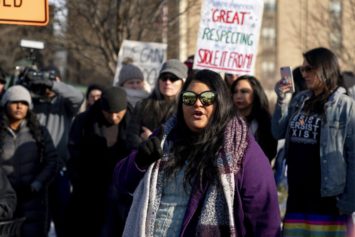
After years of debate, a U.S. government board has voted unanimously to rename Utah’s Negro Bill Canyon, overruling a recommendation by Utah officials to keep the name. (John Hollenhorst /The Deseret News via AP, File)
SALT LAKE CITY (AP) — After years of debate, a U.S. government board has voted to rename Utah’s Negro Bill Canyon, overruling a recommendation by Utah officials to keep the name.
The U.S. Board on Geographic Names decided Thursday to rename it Grandstaff Canyon to get rid of an offensive name, The Salt Lake Tribune reports. The vote was 12-0, with one member declining to vote. The decision comes 16 years after the board voted to keep the name.
The new name honors black rancher and prospector William Grandstaff, whose cattle grazed there in the 1870s.
“His name was Grandstaff; it was not Negro Bill,” said Wendi-Starr Brown, a member of the federal board who is Native American. “I’m pretty sure that’s not how he wanted to be addressed in life.”
Brown is a member of the Narragansett Indian Tribe who represents the Bureau of Indian Affairs on the federal board.
The Utah Committee on Geographic Names had recommended keeping the name, citing a lack of consensus from state minority groups.
The NAACP said the name is not offensive and preserves the history of the site, while the Utah Martin Luther King Jr. Commission called the name “blatant racism.”
The canyon is home to a popular hiking spot in Moab, the gateway to stunning, massive red rock formations. Local officials and business owners have long said the name generates frequent complaints and outcry from tourists who come from around the world, lured by the red-rock landscapes in nearby national parks.
A proposed name change in 1999 failed after it received little government support.
Spurred by complaints from tourists, the Grand County Council voted in January to change the name after refusing to do so in 2013 and 2015.
A year ago, the federal Bureau of Land Management changed signs to say “Grandstaff Trailhead” instead of “Negro Bill” trailhead.
“I think we have to look forward,” said federal board member Elizabeth Kanalley, manager of National Geospatial Services at the Forest Service.
She said keeping the old name would not recognize that it is hurtful to people.
Mary McGann, a member of the Grand County Council, said she’s very happy with the decision.
“It needed to go because it was enabling,” McGann said. “It was the right thing to do.”
But Moab resident Donna Jordan, a member of the Grand County Historic Preservation Commission, said she disagrees with the decision.
Why do we need to change the historic canyon name? This is similar to removing historic statues to appease a few,” Jordan said. “History is history. If we hide those lessons and are not reminded of them, we do not learn from them.”

